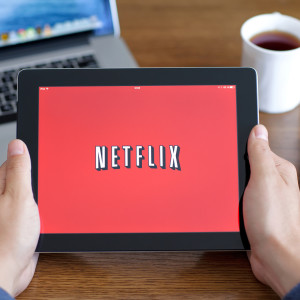Net neutrality supporters were largely silent Friday on the revelation video streaming service Netflix — a chief proponent and poster child of the push for strong net neutrality regulations adopted by the Federal Communications Commission — throttles its video traffic to mobile users on AT&T and Verizon.
The Wall Street Journal broke the story Thursday night, reporting Netflix has been throttling video traffic to AT&T and Verizon mobile customers for the last five years, inhibiting their ability to stream video from the provider in high-definition or the maximum allowable quality.
In a blog post Thursday night following the story, Netflix claimed it slows download speeds and reduces quality to protect consumers from exceeding their data caps on mobile networks, and said it does not throttle downloads on T-Mobile and Sprint due to their more “consumer-friendly policies.”
As the largest wireless carriers in the U.S., Verizon and AT&T are undoubtedly responsible for the majority of mobile demand on Netflix’s network compared to T-Mobile and Sprint. The explanation also fails to address the fact both Verizon and AT&T had millions of customers on unlimited data plans in the first years of Netflix’s throttling.
As part of the disclosure Netflix announced it “will soon introduce a data saver feature designed for mobile apps” to “provide members with more control over their data usage when streaming on mobile networks, allowing them to either stream more video under a smaller data plan, or increase their video quality if they have a higher data plan.”
Netflix was frequently cited as the chief example for strong net neutrality regulations adopted by the FCC last year, which forbid wired and wireless Internet service providers from blocking, throttling or prioritizing Web traffic for higher-priced exclusive deals with edge providers like Netflix, Google-YouTube, Amazon and Hulu.
In the year-long fight leading up to the rules Netflix claimed and it was widely reported both AT&T and Verizon engaged in throttling Netflix traffic in order to force the company into paying more for acceptable download speeds to customers.
Those accusations resurfaced last week, which it turns out Netflix itself was responsible for. And while the FCC’s 2015 Open Internet Order installing the three bright line net neutrality rules only applies to ISPs (edge providers still fall under the FTC’s jurisdiction), opponents of the rules wasted no time pointing out Netflix’s hypocrisy.
“There are many different reasons to be concerned about the discovery that Netflix has been engaged over a period of years in throttling the speed of its videos accessed by Verizon and AT&T wireless subscribers,” Randolph May, president of the free market think tank Free State Foundation said Friday.
“First is just Netflix’s complete lack of transparency about the practice, especially in light of its strident advocacy against treating Internet communications differentially. Netflix’s hypocrisy in this regard is pretty stunning, if perhaps not surprising,” May said.
May added the revelation exposes a double standard in the FCC’s heightened regulations over ISPs.
“I don’t really want to see Netflix’s practices regulated by the FCC either,” he continued. “But by acting in the way it does, the FCC lends itself to becoming part and parcel of Netflix’s hypocrisy.”
Berin Szoka of TechFreedom — one of the policy groups that submitted comments to the court where the rules are being challenged by the broadband industry — said there’s nothing wrong with throttling video, which in some cases can benefit consumers. According to Szoka, what’s really at issue is Netflix’s lack of transparency and the FCC’s absence of knowledge.
“It turns out Netflix was really saying ‘Net neutrality for thee, but not for me,’” Szoka said Friday. “Was Netflix afraid the angry mob it helped create would turn on it? And where was its talk of ‘striking a balance that ensures a good streaming experience’ when it was lobbying the FCC to ban throttling outright?”
“Are our new Internet cops so clueless that they failed to notice the difference between Netflix speeds on various mobile networks?” he continued. “Are they so blinded by their preconceived narrative — ‘Must regulate ISPs, must protect Netflix!’ — that they simply failed to ask the question? Or did they know, but look the other way — while picking winners and losers in how they applied their ‘strong net neutrality’ rules?”
Net neutrality advocates themselves were largely silent on revelation, with chief net neutrality advocacy group Public Knowledge — whose former president Gigi Sohn helped draft the rules as a counselor in FCC Chairman Tom Wheeler’s office — refusing InsideSources’ request for comment.
Pro-net neutrality advocates Free Press and Consumer Federation of America did not respond to requests for comment.
“While we’re disappointed to hear that Netflix has been throttling its videos for AT&T and Verizon customers, I think it’s important to realize that this wasn’t a violation of net neutrality, since it was the edge provider itself who made the decision to throttle its own traffic,” Jeremy Gillula, a staff technologist at the Electronic Frontier Foundation, told InsideSources Friday.
The digital civil liberties group also advocated the adoption of strong net neutrality rules leading up to the FCC’s rulemaking last February.
Gillula said AT&T and Verizon weren’t directly interfering with Netflix traffic, adding “customers who were unhappy with their experience were always free to switch to a different video service that provided higher bandwidth streaming.”
“With that said,” he continued, “our disappointment stems from the fact that Netflix didn’t explain this earlier, since we believe that all companies should be clear and transparent with their customers about what to expect when it comes to the services they subscribe to.”

